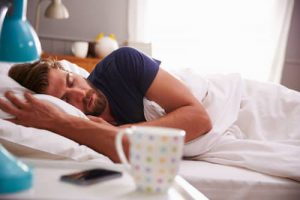 Over ten million people in the United States suffer from poor rest as a result of obstructive sleep apnea, or OSA. While there are treatment options available to address the situation, there are also ways to address OSA from home. Better sleep habits and a more active lifestyle can go a long way towards improving your sleep.
Over ten million people in the United States suffer from poor rest as a result of obstructive sleep apnea, or OSA. While there are treatment options available to address the situation, there are also ways to address OSA from home. Better sleep habits and a more active lifestyle can go a long way towards improving your sleep.
Addressing Sleep Apnea from Home
- Maintain a sleep schedule: One way to improve sleep is to maintain a regular schedule. You should go to bed and wake up at the same times every day, even on weekends and holidays. Doing so can help you obtain better rest and potentially reduce the risk of sleep apnea.
- Avoid caffeine before bed: Drinking caffeine or alcohol in the two to four hours before bed can have negative impacts on your sleep. We recommend drinking water before bed instead.
- Exercise: Obesity is a major factor behind obstructive sleep apnea. However, by exercising regularly and enjoying a better diet you can lose weight in a healthy manner, which also helps reduce the chances of sleep apnea episodes occurring.
- Change how you sleep: What is your bedroom like? If you have a TV, computer, or if you browse a smartphone while in bed, you could be hurting your ability to fall asleep and obtain the rest necessary to function properly during the day. We suggest keeping your bedroom free of distractions and ensuring the room is dark and cool.
What If I Need Treatment?
If these lifestyle changes don’t address your OSA we can suggest treatment. A CPAP machine is worn at night and helps ensure a steady of flow of air while your sleep, preventing obstruction. An oral appliance is similar to a nightguard and moves the jaw forward slightly to prevent the collapse of soft tissues and the obstruction of airflow.






